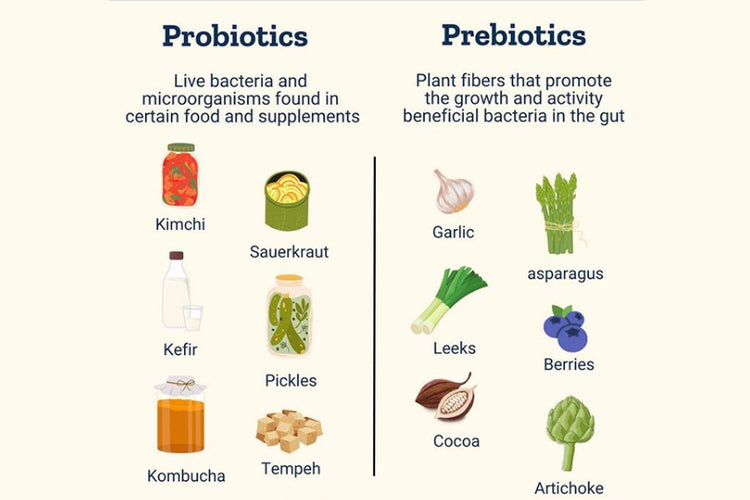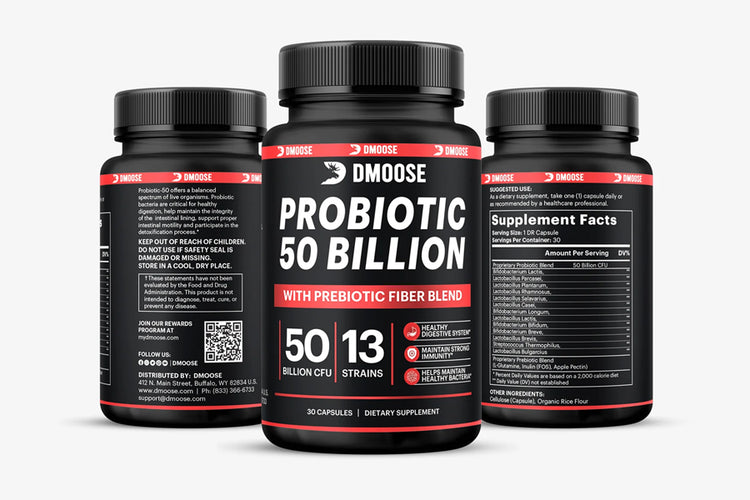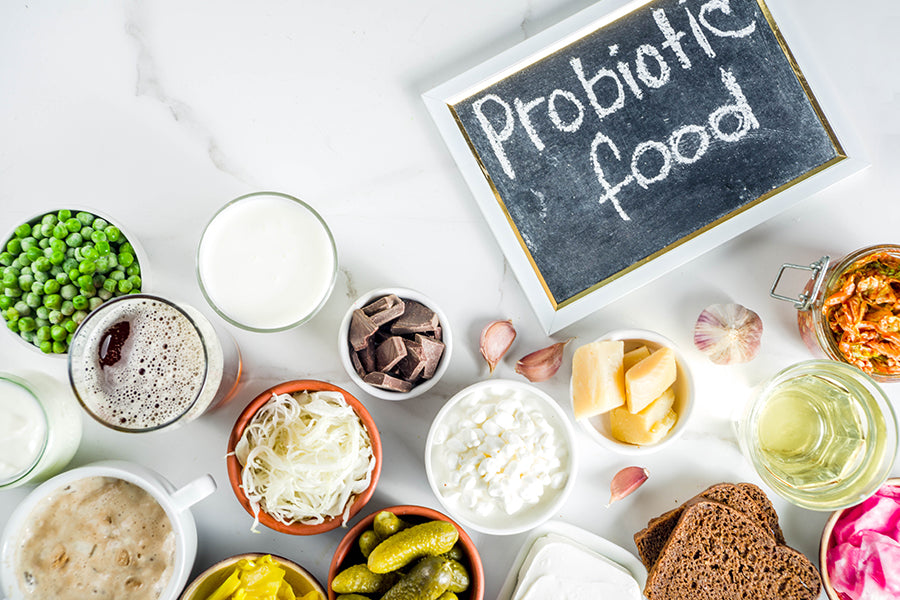Your gut is home to trillions of bacteria, both good and bad. The balance between these bacteria is vital for your overall health and well-being. When the harmful bacteria outnumber the good bacteria, it can wreak havoc on your gut and cause various health issues.
Do you ever find yourself constantly feeling bloated, experiencing indigestion, or struggling with frequent illnesses? These might be signs that your gut health is not at its best. Your digestive system plays a crucial role in your overall health, mood, and well-being, and it needs to be given the care and attention it deserves.
The majority of diseases begin in the digestive tract when "good" bacteria are no more able to control "bad" bacteria. ~Elie Metchnikoff (The Father of Probiotics and Nobel Laureate)
Fortunately, probiotics can be an excellent solution to this problem. Let's move further to explore the signs that suggest you need probiotics and some tips for promoting a healthy gut with probiotics. But before that, let's see what gut microbes and probiotics are.
What Is the Gut Microbe, and How Does It Affect Your Health?
Your gut microbes are the trillions of bacteria in your digestive system. These microbes play a significant role in your health, as they influence many processes in your body, such as digestion, nutrient absorption, metabolism, and immune function. When these bacteria are balanced and working harmoniously together, they can help to keep you healthy and energized.
However, if the balance between good and bad bacteria is disrupted, it can lead to various health issues such as indigestion, bloating, fatigue, headaches, and even food intolerances.
What Is the Difference Between Prebiotics and Probiotics?

Prebiotics and probiotics are important for gut health, but they work differently. Prebiotics are non-digestible fibers that act as food for the good bacteria in your gut. They provide nutrition to the beneficial bacteria, promoting their growth and helping them thrive.
Probiotics, on the other hand, are live microorganisms (such as bacteria or yeast) that can help restore the balance of good bacteria in your gut. When taken regularly, these supplements can help to improve digestion and boost your immune system.
You can find probiotics in various nutrient-packed foods, including yogurt and sauerkraut. Prebiotics, however, exist naturally in whole grains, bananas, and vegetables like onions, garlic, soybeans, and artichokes. Furthermore, if you're looking for an extra boost of these powerful nutrients, both probiotic and prebiotic supplements are available too!
Related Article: 6 Prebiotic Foods to Add to Your Diet for Better Gut Health
Signs You May Need Probiotics
The most common sign that you may need probiotics is digestive discomfort. This can range from mild bloating and gas to severe symptoms like chronic diarrhea or constipation. If you're experiencing any of these issues, it could be a sign that your gut needs extra probiotic support.
Additionally, if you've recently taken antibiotics, the good bacteria in your stomach might have been depleted, so adding a probiotic supplement may help to restore balance.
You may also notice other symptoms, which are as follows:
Your Bowel Movements Are Irregular
Are you one of those people who experience frequent constipation or diarrhea? If so, it is time to look into probiotics. Probiotics are live bacteria scientifically shown to promote better gut health. They help to regulate bowel movements, preventing constipation and improving overall gut function. Regular probiotic consumption can also help alleviate irritable bowel syndrome (IBS) symptoms.
You Experience Frequent Bloating and Gas
Bloating and gas can be uncomfortable, to say the least. Fortunately, incorporating probiotics into your daily routine can help to alleviate these symptoms. Probiotics work by regulating the microflora in your gut, promoting the growth of healthy bacteria, and reducing inflammation in the gut. This leads to a reduction in bloating and gas.
You Struggle With Frequent Infections
Probiotics may be the answer if you constantly battle infections, ranging from colds and flu to urinary tract infections (UTIs). Probiotics have been shown to boost your immune system, making it more effective in fighting off infections. They have also been shown to reduce the length and severity of infections, making it easier for your body to recover.
You Suffer From Anxiety, Depression, or Other Mental Health Conditions
Did you know that your gut health can affect your mental health? Recent studies have shown a strong link between gut health and mental health, with poor gut health contributing to anxiety, depression, and brain fog. Fortunately, probiotics can help to address this issue. They work by reducing inflammation and promoting the growth of good bacteria in the gut, leading to a reduction in mental health symptoms.
Your Diet Contains Processed Foods

Your gut health might suffer if you regularly indulge in high-fat, high-sugar, or processed foods. Processed foods are known to disrupt the gut microbiome and reduce the growth of good bacteria in the gut.
Fortunately, incorporating probiotics into your daily routine can counteract this. Probiotics restore your gut health by promoting good bacteria growth and improving overall health outcomes.
You Have a Weakened Immune System
Your gut houses over 70% of your immune system, which means that if your gut is imbalanced, it can adversely affect your immune function. Probiotics can help boost your immune system and reduce inflammation if you get sick often.
You Have Skin Issues
The link between gut health and skin health is becoming increasingly evident. Skin conditions, such as eczema, acne, and rosacea, can be improved by taking probiotics. This is because probiotics help balance the bacteria in your gut, improving your skin's health and appearance.
Why Take Probiotics

The benefits of probiotics are vast and varied. Here are some of the key benefits you can expect to experience with regular probiotic consumption:
Improved Digestion
Probiotics help to improve your digestion by promoting the growth of healthy bacteria in your gut, reducing inflammation, and regulating bowel movements. This helps to reduce bloating and gas while improving overall digestive health.
Probiotics also help reduce intestinal inflammation, benefiting people suffering from irritable bowel syndrome (IBS) or other gastrointestinal issues. By restoring this natural balance, probiotics can improve your digestive system's ability to process and absorb food more efficiently. Taking a daily probiotic supplement is easy to get more beneficial bacteria into your system and start feeling the positive effects on your digestion.
Boosted Immunity
Probiotics have been scientifically shown to boost your immune system, making it more effective in fighting infections like colds and flu. They also work to reduce inflammation throughout the body, which can contribute to a weakened immune system over time. You can also add Elderberry C Immunity in your diet for better results.
Related Article: Can Improving Your Immune System Help Getting Rid of Allergies? A Comprehensive Guide
Improved Mental Health
There is an increasing awareness of the link between gut and mental health. Poor gut health can increase the risk of anxiety, depression, and brain fog. Consuming probiotics regularly helps reduce inflammation in the gut, which can help improve your overall mental health.
Probiotics also boost serotonin production, which can help regulate mood and enhance your overall sense of well-being. Plus, they protect against toxins that could potentially damage nerve cells, making it easier for your brain to function optimally and supporting better cognitive functioning.
Healthier Skin
Probiotics are beneficial for the skin too! They restore balance in the gut microbiome, resulting in healthier skin with fewer breakouts or flare-ups related to conditions such as eczema or psoriasis.
Probiotics help maintain the balance of bacteria on your skin, reducing inflammation and keeping your complexion looking its best. Probiotics also help protect against environmental stressors like UV radiation, so they help prevent premature aging. Furthermore, probiotics can help improve your skin's natural ability to retain moisture, reducing flakiness and making sure your skin looks soft and hydrated.
Reduced Risk of Chronic Illness
Introducing beneficial probiotics into your diet can reduce your risk of developing chronic illnesses like diabetes, heart disease, and obesity. Probiotics help to balance the bacteria in your gut, which helps to break down food more efficiently and improves overall health. In addition, probiotics have been found to boost immunity by stimulating the production of antibodies that protect against illness-causing bacteria and viruses.
Better Nutrient Absorption
Probiotics help break down food, making it easier for your body to absorb the essential vitamins and minerals. This helps to support overall health and well-being.
Probiotics are essential to a healthy diet, providing numerous benefits to those who consume them regularly. From improved digestion and mental health to healthier skin and better immune function, probiotics can be a great addition to any lifestyle!
How to Help Your Gut
Adding a probiotic supplement is the most effective way to help restore balance and good bacteria in your gut, but there are other steps you can take as well.
Increase Your Intake of Fermented Foods
Incorporating fermented foods into your diet is one of the easiest and most natural ways to get more probiotics. These include yogurt, kefir, sauerkraut, kimchi, and other pickled vegetables. Eating these foods regularly can help boost the good bacteria in your digestive tract.
Take a Probiotic Supplement

Taking a daily probiotic supplement is a great way to increase the number of beneficial bacteria in your gut. When choosing a supplement, ensure it contains at least 10 billion CFUs (colony-forming units) per dose. One such product includes the Probiotic 50 Billion CFU.
It's also essential to look for a product that contains multiple strains of probiotics, as this will help target different areas in your digestive tract.
Eat Prebiotic Foods
Besides taking probiotics, prebiotic foods can also help feed the beneficial bacteria in your gut and promote balance. These include oats, bananas, apples, onions, and garlic. Eating these types of foods regularly can provide added support for your digestive system.
Reduce Stress Levels
It's no secret that stress can take a toll on our health - including our gut health. That's why managing stress levels and finding ways to relax daily is essential.
There are many ways to reduce stress, such as walking, doing yoga or meditation, listening to music, or reading books. Identifying what helps you relax and setting aside time each day to do those activities can make a difference in managing your overall stress levels.
Additionally, it's important to pay attention to your body's early warning signs that things may be out of balance; if you start feeling overwhelmed, take some extra time for yourself
Take Probiotic-Rich Foods
Probiotic-rich foods such as kimchi, kombucha, sauerkraut, and kefir are excellent sources of natural probiotics. Incorporating these foods into your diet can help foster a healthy balance of good bacteria in your gut.
Eat Fiber-Rich Foods

Eating fiber-rich foods is a great way to help your gut and keep it healthy. Fiber-rich foods can promote the growth of beneficial bacteria in your gut and help stimulate digestion.
Examples of high-fiber foods include fruits and vegetables, whole grains, legumes, nuts, seeds, and beans. Eating diverse foods will ensure you get all the essential nutrients your body needs for proper functioning.
Reduce Sugar & Processed Food Consumption
Sugary and processed foods can disrupt the balance of bacteria in your gut, leading to an overgrowth of pathogenic bacteria. Reducing sugar and processed food consumption can help you take significant steps toward maintaining a healthy gut. Start by swapping out sweet snacks for healthier alternatives like fresh fruit or veggies.
If you're craving something sweet, try having a piece of dark chocolate instead of candy or cookies. It's also a good idea to read nutrition labels to ensure that there are no added sugars in the foods you're eating. You can also switch recipes to reduce the sugar used when cooking at home.
Exercise Regularly
Regular exercise has been shown to support gut health by promoting the growth of beneficial gut bacteria. Engaging in at least 30 minutes of moderate-to-vigorous exercise daily is recommended to maintain gut health.
By taking these steps, you can help restore balance to your digestive system and get back on track. Remember - it may take some time for the benefits of probiotics to show, so don't be discouraged if you don't see results immediately. With a bit of patience and dedication, you'll feel better soon!
FAQs
1. Can probiotics be harmful?
In general, probiotics are safe for most people. However, in rare cases, they can cause side effects such as gas, bloating, and diarrhea. If you experience any adverse effects, stop taking probiotics and talk to your healthcare provider.
2. Is it necessary to take a daily probiotic supplement?
A daily probiotic supplement is unnecessary if you get enough probiotics from your diet. However, a daily probiotic supplement may be beneficial if you have specific health concerns or dietary restrictions. Remember to always consult your Doctor before starting any new supplements.
3. Should women take a probiotic daily?
A probiotic is unnecessary for all women, but it can be beneficial if you have specific health concerns or dietary restrictions. Probiotics can help restore balance to your digestive system and promote good gut health. However, consult with your healthcare provider before taking any supplement.
4. Can I get probiotics from food?
Certain foods are rich in probiotics, such as yogurt, kefir, sauerkraut, and kimchi. However, getting enough probiotics from these sources alone may be challenging, depending on your diet and lifestyle.
5. When is the best time to take probiotics?
Taking probiotics on an empty stomach is recommended, preferably first thing in the morning or before bed. This allows the probiotics to reach your gut without being hindered by food.
The Bottom Line
Regularly taking probiotics can be a great way to promote better gut health and improve overall health outcomes. Incorporating probiotic-rich foods into your diet or a probiotic supplement can help alleviate symptoms of constipation, bloating, gas, and infections while improving mental health symptoms.
To improve your gut health, look into probiotics and add them to your daily routine. Your gut will thank you later.
Reading List
Article Sources
- Hills, Ronald D., et al. "Gut Microbiome: Profound Implications for Diet and Disease." Nutrients, vol. 11, no. 7, July 2019, p. 1613. PubMed Central, https://doi.org/10.3390/nu11071613.
- Wallace, Caroline J. K., and Roumen Milev. "The Effects of Probiotics on Depressive Symptoms in Humans: A Systematic Review." Annals of General Psychiatry, vol. 16, no. 1, Dec. 2017, p. 14. DOI.org (Crossref), https://doi.org/10.1186/s12991-017-0138-2.








